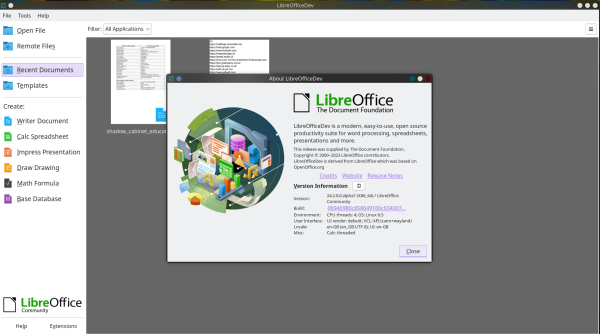Yesterday saw the release of the first beta version of LibreOffice 24.2, the forthcoming next version of this popular free and open source office suite, which is due for release on February 2024, as announced on the LibreOffice QA blog.

Your ‘umble scribe has already downloaded the beta from the development builds server for testing. So far it’s working well with my usual suite of extensions, which extend the software’s functionality.
If anything untoward occurs with the beta, then a bug report will be filed.
Meanwhile, in the boardroom…
Away from coding, news has arrived that elections are to be held soon for the Board of The Document Foundation (TDF), the German-based non-profit organisation behind LibreOffice.
Eleven member of the LibreOffice community are standing as candidates with a joint Pledge (our promise) to the LibreOffice community. It’s not just a positive vision of the future, but includes immediate action points that we can take to fix TDF from the outset.
The eleven are Sophie Gautier, Eliane Domingos, Osvaldo Gervasi, Paolo Vecchi, Jean-Baptiste Faure, Franklin Weng, Daniel Rodriguez, Mike Saunders, me (Andreas Mantke), Jean-François Nifenecker and Enio Gemmo.

The full English text of the Pledge is reproduced below, in addition to which it has been translated into the following languages:
The Pledge itself reads as follows verbatim:
Our main promises to you
We will bring back tenders.
- We will implement tenders in a way that allows more companies to participate.
- Having only very few and always the same bidders is not sustainable. We will bring a tender process that creates a welcoming environment for all potential bidders. We will create opportunities for everyone, from single developers to large organisations.
- We will hear the valuable input from the Engineering Steering Committee on the important projects and will make them a reality.
- We will work together with the valuable companies from the ecosystem, existing and new ones. Together we will achieve something good for LibreOffice and for everyone involved.
We will be an open and transparent board from day one. We are accountable to all of you. We will not act as a closed group.
- We will have no private board meetings, unless it is absolutely necessary. With very little room for exceptions, there will be only public meetings with a proper agenda and proper minutes that we share in time.
- Board meetings will be at different times. We want that all community members have a chance to join, especially those who cannot participate during working hours.
- There will be fewer, but much more effective meetings. We will focus on strategy, not on day-to-day micromanagement. Meetings every two weeks hardly work for volunteers. A lot more responsibility for everyday business can be laid in the hands of the team.
- We promise monthly public status reports to show what the board is working on. They will be translated into many languages. We encourage and take feedback from the worldwide community to the heart. You are experts in your fields and we listen to you.
- We will install a liquid democracy system as proper tooling for direct community participation in the foundation’s decisions.
We will break the language barriers. English is not a requirement to participate any more.
- We will make sure agenda and minutes for board meetings will be translated into many languages.
- If English is used, we will use “simple plain English”, so more people can understand.
- We promise monthly public calls with the native language community. We want to hear from you and support your activities.
- For these calls, we will ask community members to help with live translation, so all community members can participate.
- We will host at least one of the next two official LibreOffice Conferences out of Europe, e.g. in South America or Asia.
We will value all contributors equally.
- Developers and non-developers, volunteers, company employees and TDF’s team, we are all one, respectable community.
- Nobody should be discriminated for their role. Nobody should be scared to speak out in public.
- We will credit contributors publicly.
- Nobody should feel like “second class” community members any more.
We also promise you this
We will make TDF recognized.
- We will work hard to have TDF be recognized worldwide at governmental level and within the European Union. We will start to actively contact them as a non-profit foundation.
- As one of the leading foundations, TDF must “sit at the table” in standards bodies and when important legislative decisions are taken. We must be seen as a trustworthy reference point of contact for office productivity.
We will actively grow the ecosystem.
- We will create incentives for current and new companies working with LibreOffice.
- We will support them to enter the market.
- Our goal is to have at least two independent companies joining the market in the next two years and many new products based on LibreOffice Technology.
- We will not only aim at direct code contributions, but also ease of use, accessibility and documentation. There will be many more companies that can bid on tenders for work that was underloved for some time.
- We will evaluate the hiring of an independent business partner manager, with a proper mission to achieve this goal and be accountable.
- We will work with the ecosystem on solutions for online and mobile versions of LibreOffice, that benefit both the companies and the community.
We will make development more fun and support our fantastic developer community.
- We will support the community to organize more Hackfests again, ideally in different countries.
- We will offer the developer community to evaluate new and more modern development tools that could make hacking on LibreOffice more exciting and more fun. We will let the developers independently voice what is best for LibreOffice and we are committed to invest in areas important for our developer community.
- We will evaluate to hire one or more developers to fix the most reported bugs from the community and grow the code contributions from the foundation itself. This makes us a better free software and open source citizen.
- We will develop a strategic development plan for the next 24 months, with measurable goals and milestones.
- We will seek funding to implement, directly or through partners, features and improvements that would make a difference to many people and uses.
How we will achieve our goals
Promises are easy to make. Here is our plan how to make them a reality:
Legal issues have been in the way for several years now. If we work together with shared goals in mind, seriously take into account our legal counsels’ advise, we can very soon focus again on actual and important projects that are not getting done right now, because too much time is spent with fights and discussions.
We have experts in many fields in our community, in the companies and in our team – let’s source their knowledge and their passion for LibreOffice! We will encourage everyone to speak out, contribute their knowledge and bring in their unique skills and talent. We will work with trust, respect and mutual appreciation, to achieve the best for TDF.
Good ideas need space to develop and unfold. Only then we can bring the office suite to a new threshold of effectiveness, user friendliness and only then we can evaluate new technologies for incorporation into LibreOffice.
We will also encourage everyone to work much more with other free and open source communities or civil society organizations, to widen their horizon, contribute something good to the world and also learn what challenges others face and how they deal with them.
Conflicts of Interest
One of the main challenges in the past board term was conflict of interest. We don’t want endless discussions, we will implement the solution.
Some of us are members of the team and get paid by TDF, others are working for companies that make business with LibreOffice. We know that there is no difficulty left if people with conflicts of interest are barred from being near decision making. And therefore we hereby promise and guarantee that we will keep out of all decisions and also discussions that could affect our own personal interests, and that we will declare these interests regularly.
Board members who are also team members will work on board matters in their spare time. All board members will follow the existing conflict of interest policy and keep out from any discussion and any decision that could create a conflict of interest for them.
Our goal is to “prevent possible conflicts of interest within the foundation” as laid down in the statutes and set a standard to follow.
The Document Foundation has been built by the community, for the community. We are members of the community who want to run for the next election of the board, to bring TDF back to its golden times – with a happy community, working together creatively, inspiring each other, where everyone has a place to contribute to our common goal.






 The EU Commission
The EU Commission  Over the last few weeks the Free Software Foundation Europe (FSFE) has been running a fundraising campaign to translate its “What is Free Software” video into more European
languages. The FSFE’s Ana Galán writes: “Tanks to your contributions, it is now available in 12 languages! Albanian*, Danish, Dutch, English, French, German, Greek, Italian, Polish, Portuguese, Spanish and Swedish! You can find them all at
Over the last few weeks the Free Software Foundation Europe (FSFE) has been running a fundraising campaign to translate its “What is Free Software” video into more European
languages. The FSFE’s Ana Galán writes: “Tanks to your contributions, it is now available in 12 languages! Albanian*, Danish, Dutch, English, French, German, Greek, Italian, Polish, Portuguese, Spanish and Swedish! You can find them all at 


 Today’s
Today’s